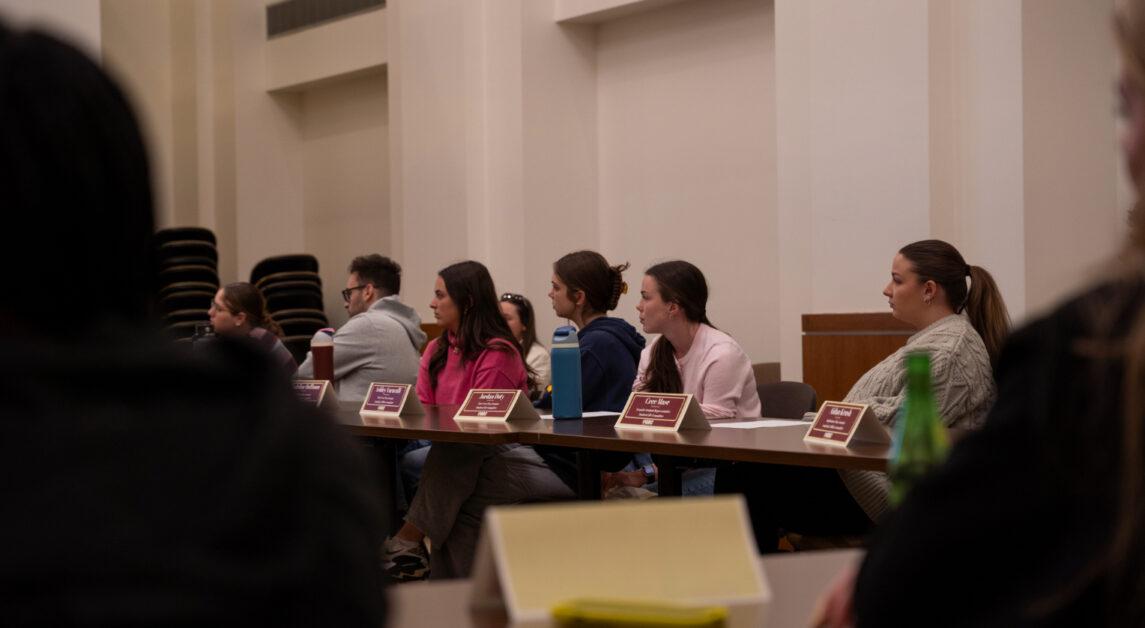“It’s a tight knit community I’d say, even though it’s anonymous,” Isaiah Mathieu, co-founder of Herrd, a new app for Boston College students, said. “For example, if you go and scroll through the app you’ll see a bunch of posts and the majority of them, they relate to BC in some way, shape, or form. So, it’s sort of like, ‘If you know you know.’”
Herrd co-founders Mathieu and Carter Beaulieu, both BC ’20, began working on an app during their senior year at BC in order to help people learn more about what events were happening in their area and who would be attending them.
When the COVID-19 pandemic hit and there were no longer events taking place, Mathieu and Beaulieu had to shift their plans. Their solution? A platform where BC students could communicate anonymously.
“COVID was sort of a blessing in disguise, because after we all got booted off campus the second semester of last year, Herrd, I feel, has allowed students to stay connected,” Mathieu said.
Herrd has about 2,000 sign-ups and 500 active users, who anonymously post questions, memes, or anything that’s on their mind. Other users can up or downvote a post—somewhat akin to likes or dislikes on other social media platforms—and can comment and chat with each other.
“It’s all anonymous, so at the end of the day if your post gets upvoted you can just feel good inside, but there’s no superficial stuff,” Beaulieu said.
Though anonymous online communities are not a novel concept, Beaulieu and Mathieu wanted to make Herrd distinctly different in their approach to safety and the monitoring of posts.
All Herrd users must have a valid BC email to use the app—a move meant to make it easier for the founders to trace harmful or hateful content back to whoever posted it.
Though the veil of anonymity might encourage people to post something offensive, Mathieu and Beaulieu believe that having students’ emails connected to their profiles makes them think twice before posting something negative.
They’ve only received one incident so far in which a student’s content violated Herrd’s terms of service, and the user’s account was subsequently suspended. Mathieu and Beaulieu also said that if they deem content harmful enough, they would consider getting the BC administration involved in the case.
Though Mathieu and Beaulieu are always on the lookout for reports of offensive content to make sure Herrd is a safe and welcoming online community, students have still been enjoying the app.
The co-founders said that the most trendy posts right now are jokes and discussions about the Undergraduate Government of Boston College presidential election and Kirkwood Cookies, a student-run company that delivers cookies to the BC community.
Students using the app have been forming new connections—something Mathieu and Beaulieu are proud of, especially in the era of COVID-19—and are asking for new features to be added to the app.
Though Mathieu and Beaulieu both have full-time jobs and have to manage Herrd on the side, they’re planning to launch a messaging function soon so that students can connect with each other one-on-one.
Looking to the future, Beaulieu and Mathieu said that they are excited for what’s to come. Though BC is functioning like a test community for now, they hope that Herrd can one day expand to other college campuses, or even beyond, incorporating event information from their first app, anonymous chatting, and other new features.
“I think it can be kind of your all-inclusive hub to understand everything that’s going on and ask questions and do stuff like that,” Beaulieu said.
The partners said that they are utilizing different promotional strategies to grow Herrd’s user base. Mathieu, who primarily handles the business end of the project, said they use social media, student ambassadors, and partnerships with local businesses as avenues to grow.
Josh Gottbetter, a student ambassador for Herrd and CSOM ’22, helps Beaulieu and Mathieu stay connected to what’s happening on campus. He said that he provides context for topics that students are talking about on Herrd, helps advertise the app on social media, and monitors posts for negative content.
Though he’s seen conversations become toxic and overly political at times, Gottbetter believes in the app’s mission and thinks students really enjoy having access to a community like Herrd.
“I think the coolest thing was when I started to see people posting about it that I didn’t even know, people on their Snapchat stories were like, ‘Oh my gosh, I can’t believe this app is free,’” Gottbetter said.
Part of making Herrd sustainable is securing revenue, Gottbetter said, so he helps Mathieu and Beaulieu make connections with local businesses and potential advertisers. Beaulieu says they’re hoping to utilize the app’s pinned post feature to help connect students with promotional content.
“Currently, a lot of those messages are just like icebreaker questions that get people to reply,” Beaulieu said. “But eventually, we’ll have local venues or local restaurants, whatever, promoting on that pinned post, and they can offer a promo code code or discount code so then students can see that post, we can reach all these students using the app and it’ll be a win-win for whoever’s kind of promoting there and then for us as well.”
Mathieu and Beaulieu are excited to watch Herrd grow, and hope that in the COVID-19 era and beyond it will be a place where users feel comfortable sharing their opinions, jokes, or questions in a safe community of students like themselves.
“It’s a good way to just stay involved and stay in the loop of things when you can’t really see a lot of people face-to-face,” Beaulieu said.
Featured Graphic by Olivia Charbonneau / Heights Editor







